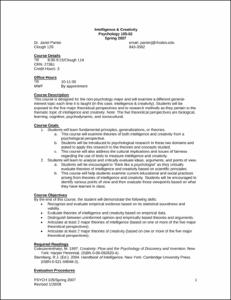Please use this identifier to cite or link to this item:
http://hdl.handle.net/10267/3628| Title: | PSYC 105-02, Intelligence and Creativity, Spring 2007 |
| Authors: | Panter, Janet |
| Keywords: | Psychology, Department of;Syllabus;Curriculum;Academic departments;Text;Academic departments;Text;Academic departments;Text;2007 Spring |
| Issue Date: | 11-Jan-2007 |
| Publisher: | Memphis, Tenn. : Rhodes College |
| Series/Report no.: | Syllabi CRN |
| Abstract: | Course Description This course is designed for the non-psychology major and will examine a different general-interest topic each time it is taught (in this case, intelligence & creativity). Students will be exposed to the five major theoretical perspectives and to research methods as they pertain to the thematic topic of intelligence and creativity. Note: The five theoretical perspectives are biological, learning, cognitive, psychodynamic, and sociocultural. Course Goals 1. Students will learn fundamental principles, generalizations, or theories. a. This course will examine theories of both intelligence and creativity from a psychological perspective. b. Students will be introduced to psychological research in these two domains and asked to apply this research to the theories and concepts studied. c. This course will also address the cultural implications and issues of fairness regarding the use of tests to measure intelligence and creativity. 2. Students will learn to analyze and critically evaluate ideas, arguments, and points of view. a. Students will be encouraged to “think like a psychologist” as they critically evaluate theories of intelligence and creativity based on scientific principles. b. This course will help students examine current educational and social practices arising from theories of intelligence and creativity. Students will be encouraged to identify various points of view and then evaluate those viewpoints based on what they have learned in class. Course Objectives By the end of this course, the student will demonstrate the following skills: • Recognize and evaluate empirical evidence based on its statistical soundness and validity. • Evaluate theories of intelligence and creativity based on empirical data. • Distinguish between uninformed opinion and empirically based theories and arguments. • Articulate at least 2 major theories of intelligence (based on one or more of the five major theoretical perspectives). • Articulate at least 2 major theories of creativity (based on one or more of the five major theoretical perspectives). |
| Description: | This syllabus was submitted to the Office of Academic Affairs by the course instructor. |
| URI: | http://hdl.handle.net/10267/3628 |
| Appears in Collections: | Course Syllabi |
Files in This Item:
| File | Description | Size | Format | |
|---|---|---|---|---|
| 2007_sp_PSYC_105-02.pdf | 54.15 kB | Adobe PDF |  View/Open |
Items in DSpace are protected by copyright, with all rights reserved, unless otherwise indicated.